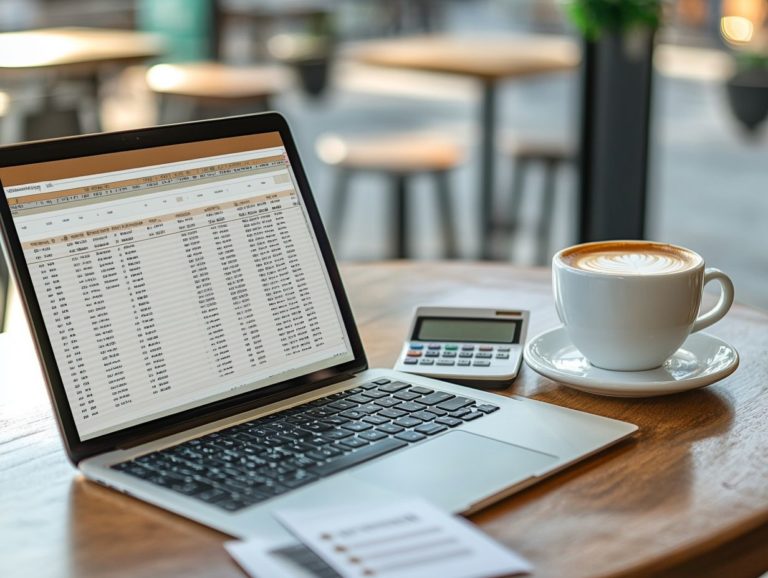6 Mistakes Freelancers Make with Their Finances
Freelancing offers flexibility and independence, but it also presents unique financial challenges. Many freelancers struggle with managing their income and expenses, often falling into common pitfalls that can negatively affect their finances.
Mistakes such as mixing personal and business finances, failing to save for retirement, and other missteps can have lasting repercussions. In this discussion, we will explore six of the primary financial mistakes freelancers make and provide recommendations on how to avoid them.
- Key Takeaways:
- 1. Not Keeping Track of Income and Expenses
- 2. Not Setting Aside Money for Taxes
- 3. Mixing Personal and Business Finances
- 4. Not Saving for Retirement
- 5. Not Having an Emergency Fund
- 6. Not Planning for Uneven Income
- How Can Freelancers Keep Track of Their Finances?
- Frequently Asked Questions
- Avoid these common financial pitfalls as a freelancer!
- How can I avoid making financial mistakes as a freelancer?
- Why is it important for freelancers to set aside money for taxes?
- What is the downside of not having a budget as a freelancer?
- How can freelancers ensure they are properly tracking their expenses?
- Why should freelancers diversify their income?
- Not keeping track of income and expenses can lead to financial chaos for freelancers.
- Setting aside money for taxes is crucial to avoid tax debt and penalties.
- Separating personal and business finances is important for financial stability and accurate tax reporting.
Contents
Key Takeaways:
1. Not Keeping Track of Income and Expenses
Tracking income and expenses is one of the most crucial aspects of a freelancer’s financial life. Not tracking well can make your finances unstable and complicate tax obligations during tax season.
Utilizing digital tools like QuickBooks and Wave Accounting is essential for maintaining accurate and organized records. These platforms offer user-friendly interfaces that enable freelancers to quickly input various income sources, including client payments, subscription services, and project-based fees.
They also assist in categorizing common freelance expenses, such as equipment purchases, software subscriptions, and travel costs, providing a comprehensive view of net earnings. By keeping accurate records, freelancers can prepare for tax time more efficiently and gain insight into their financial health, enabling them to make informed decisions that foster future growth and stability.
2. Not Setting Aside Money for Taxes
Freelancers are encouraged to proactively save for taxes to avoid unexpected liabilities and ensure they can meet their tax obligations without undue financial strain. By tracking their income and expenses throughout the year, they can better estimate their tax bill.
This practice can help reduce the stress associated with tax season and allows them to identify deductions and credits that may lead to significant savings. Having a financial plan makes it easier to set aside a specific percentage of income for taxes each month, ensuring compliance and providing peace of mind.
3. Mixing Personal and Business Finances
Mixing personal and business finances can create financial chaos, making it essential for freelancers to maintain separate accounts for their freelance work and personal expenses. By establishing dedicated business bank accounts, freelancers can streamline their financial management and accurately track earnings and expenditures related solely to their work.
This separation not only aids in managing cash flow but also simplifies bookkeeping, leading to more precise financial records. When clear boundaries between personal and professional finances are established, it becomes easier to identify tax-deductible expenses and prepare for tax season. This clear delineation fosters a more professional image, enhances credibility with clients, and contributes to a more organized financial life overall.
4. Not Saving for Retirement
One common mistake freelancers make is not saving for retirement, often overlooking the long-term benefits of utilizing retirement accounts such as those offered by Vanguard and Charles Schwab. The earlier they begin contributing, the more they will benefit from compounding interest, the process where your money earns interest on both the money you save and the interest it has already earned.
Many freelancers mistakenly believe that retirement planning is not an immediate concern; however, starting to save early can significantly enhance freelancers’ financial security in their later years and provide them with better retirement options. Solo 401(k)s, IRAs, and SEP IRAs are among the retirement accounts designed specifically for independent workers.
There are various retirement account options tailored to different income levels and financial goals. These accounts can be your best friend for a secure retirement and promote a habit of disciplined saving.
5. Not Having an Emergency Fund
Imagine having a safety net that allows you to navigate life’s surprises without stress! An emergency fund does just that. It is essential for freelancers, providing a financial cushion against unexpected events. This allows them to cover expenses without falling into debt or making drastic changes to their financial plans.
Start by setting savings goals for your emergency fund. Freelancers should aim to save at least three to six months’ worth of living expenses. This amount serves as a sufficient buffer during periods of temporary low income or emergencies.
By regularly allocating a percentage of their income into a separate savings account, freelancers can cultivate a savings habit. This gives them peace of mind, knowing they have resources to manage unexpected disruptions. Maintaining a separate savings account is crucial; it prevents funds from being used for non-emergency expenses and ensures that overall financial plans remain intact.
6. Not Planning for Uneven Income
Freelancers must plan for irregular income. Fluctuating cash flow can complicate budgeting and overall financial health if not managed properly. To prepare for uneven income, they can take the following steps:
- First, understand your profit margins. This means knowing how much money you keep after expenses. This understanding allows you to create a budget that reflects your gross income during both high and low months.
- Using financial planning tools—like budgeting apps and spreadsheet templates—can simplify tracking your income and expenses.
- These tools make it easier to predict and forecast future income. This enables freelancers to adjust their spending when necessary.
How Can Freelancers Keep Track of Their Finances?
Freelancers should implement effective systems for tracking their finances. Utilizing accounting software and bookkeeping strategies tailored to their unique needs is crucial.
By leveraging tools such as QuickBooks, which offers a comprehensive suite of invoicing and expense tracking services, or Wave Accounting, known for its user-friendliness and no-cost solutions, freelancers can significantly streamline their financial processes.
Establishing organized financial systems is essential. They facilitate real-time decision-making and ensure compliance during audits or tax season. Regularly reviewing financial records allows freelancers to identify trends, adjust budgets, and ultimately make informed decisions that enhance profitability and promote growth.
Top Tips for Mastering Your Freelance Finances!
Effective financial management practices for freelancers include budgeting, utilizing accounting software, and maintaining thorough bookkeeping. These practices ensure a stable financial position.
Sound financial management is crucial for safeguarding against unexpected expenses. It establishes a foundation for future growth. Therefore, independent workers should create a realistic budget that considers income variability and personal expenses.
Consistent tracking of spending is equally important. This enables freelancers to make informed financial decisions in the future. Regularly reassessing financial goals helps freelancers stay on track.
Digital tools facilitate the tracking and analysis of these metrics, streamlining the money management process.
What Are the Common Financial Mistakes Freelancers Make?
The most common financial mistakes freelancers make include poor management of their income and expenses, inadequate tax planning, and a lack of effective bookkeeping practices. All of these can threaten cash flow.
These mistakes often stem from a lack of understanding regarding the importance of careful expense tracking. They also often overlook setting aside sufficient funds to cover anticipated taxes. Without a solid income management plan, freelancers can easily miss small expenses that accumulate over time.
To avoid these pitfalls, freelancers should implement a comprehensive budgeting system. This allows them to closely monitor their finances. Utilizing apps designed for expense tracking can help ensure accuracy. Additionally, hiring a tax professional to clarify eligible deductions and setting aside a portion of their income for taxes can significantly improve freelancers’ financial health.
How Can Freelancers Plan for Retirement?
Freelancers must decide how much to save for retirement. They should also choose the best retirement accounts for their needs, like Vanguard accounts. Retirement planning is essential for securing their financial futures.
Freelancers have various retirement account options, each offering valuable opportunities for growth. Common account types include:
- Solo 401(k): A retirement plan that allows self-employed individuals to save for retirement.
- SEP IRA: A Simplified Employee Pension plan that offers tax advantages.
- Traditional IRA: A retirement savings account that allows individuals to direct pre-tax income towards investments.
Each account has its own contribution limits, tax implications, and investment choices. These factors can significantly impact long-term savings. Contributing early can greatly enhance savings over time due to the benefits of compound interest.
Freelancers, take charge of your future! Start planning for retirement today for a secure tomorrow. It’s important to allocate a portion of your income toward retirement accounts while also setting aside funds for daily expenses and emergency savings.
What Are the Benefits of Having an Emergency Fund?
Emergency funds offer freelancers numerous benefits, including greater financial stability and peace of mind during unpredictable times. Having an emergency fund enhances security for their savings account balance.
An emergency fund enables freelancers to cover unexpected expenses, such as medical bills and urgent home repairs, without jeopardizing their entire budget. This financial cushion allows them to make informed decisions instead of resorting to panic. By budgeting for emergencies, freelancers can concentrate on their work without constantly worrying about financial concerns.
To build and maintain an emergency fund, experts recommend that freelancers follow these guidelines:
- Set a goal of three to six months’ worth of living expenses.
- Contribute a fixed amount each month.
- Adjust contributions as necessary based on income fluctuations and life changes.
How Can Freelancers Budget for Uneven Income?
Budgeting for uneven income is an unavoidable reality for freelancers. It necessitates strategic financial planning to effectively navigate fluctuating cash flow. By employing various budgeting techniques—such as the well-known 50/30/20 rule, which allocates 50% of income to needs, 30% to wants, and 20% to savings or debt repayment—freelancers can establish a more stable financial foundation.
It is crucial to set aside surplus income during months of high earnings, creating a financial buffer for the lean months that are likely to follow. This approach enables freelancers to spend less than they earn and save the excess for future needs.
Numerous budgeting tools and apps are available to streamline this process. They allow freelancers to track expenses, predict future earnings, and manage savings goals with ease. Ultimately, this enables freelancers to achieve greater financial security.
Frequently Asked Questions
Avoid these common financial pitfalls as a freelancer!
The most common mistakes freelancers make with their finances include not setting aside money for taxes, not creating a budget, not tracking their expenses, not diversifying their income, not saving for retirement, and not having an emergency fund.
How can I avoid making financial mistakes as a freelancer?
To avoid financial mistakes as a freelancer, educate yourself on financial management. Create a budget and stick to it, track your expenses, save a portion of your income for taxes, diversify your income streams, and have savings for retirement and emergencies.
Why is it important for freelancers to set aside money for taxes?
Freelancers are responsible for paying their own taxes, unlike traditional employees who have taxes automatically deducted from their paychecks. Setting aside money for taxes throughout the year prevents you from being hit with a large tax bill at the end of the year and potentially facing penalties or interest.
What is the downside of not having a budget as a freelancer?
Not having a budget as a freelancer can lead to overspending and not having enough money to cover essential expenses such as rent, utilities, and business expenses. It can also make it difficult to plan for future goals or unexpected expenses.
How can freelancers ensure they are properly tracking their expenses?
Freelancers have various tools to track expenses, including spreadsheets and budgeting apps. Hiring an accountant is also an option.
It’s crucial to track all expenses, both business and personal. This gives you a clear understanding of your financial situation.
Why should freelancers diversify their income?
Relying on a single income source can be risky for freelancers. Income can be unpredictable and may fluctuate.
Diversifying your income by taking on different projects or having multiple clients helps provide stability. This approach enhances financial security.






